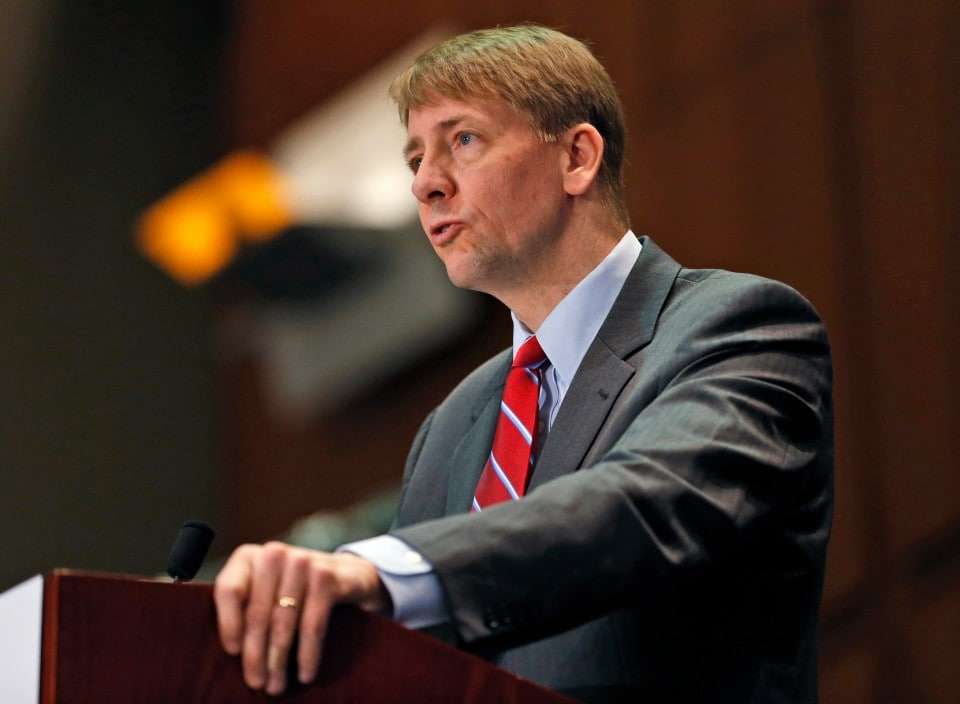The Volokh Conspiracy
Mostly law professors | Sometimes contrarian | Often libertarian | Always independent
Shootout at the CFPB corral

On Friday, Richard Cordray stepped down as director of the Consumer Financial Protection Bureau (CFPB). That same day, Cordray named former chief of staff Leandra English as the bureau's deputy director, with the expectation that this appointment would ensure continuity at the agency. According to provisions of the Dodd-Frank Act, when the director is "unavailable," the deputy is to serve as acting director.
English is not the only person claiming the authority to serve as the CFPB's acting director, however. President Trump, citing his authority under the federal Vacancies Reform Act (VRA), named Office of Management and Budget Director Mick Mulvaney as the CFPB's acting director. According to the White House, the relevant Dodd-Frank language does not preclude the use of the VRA to fill this vacancy. A Justice Department Office of Legal Counsel memorandum released on Saturday supports the president's authority to fill the vacancy created by Cordray's departure.
Over the weekend, administrative law and statutory interpretation mavens debated the relative merits of the two positions. Marty Lederman and Nina Mendelsohn think the relevant statutory language makes English the acting director, at least until the president nominates (and the Senate confirms) a replacement. Adam White and Daniel Hemel are inclined to think the White House has the stronger hand.
The stage was set for a confrontation of sorts when the CFPB opened its doors on Monday - and then the first shots were fired. Sunday evening, English filed a motion for an emergency temporary restraining order to block the Trump administration from ousting her from the agency.
Interestingly, English is being represented by private counsel. According to Reuters, CFPB general counsel Mary McLeod, who was appointed by Cordray in 2015, thinks the Trump administration has the stronger legal claim and has written a memo to this effect.
What happens now? Do not be surprised if the district court grants an initial TRO, at least for few days. Such an order would not indicate that the district court finds English's claims particularly persuasive on the merits. Rather, the point of the TRO would be to preserve the status quo, giving the respective sides time to marshal their arguments and the court time to sift through them without having to worry about any significant changes at the CFPB in the interim.
However the district court rules on this initial filing, I expect that the administration's position will ultimately prevail. Whichever side has the strongest statutory argument, the textual claims are close enough that I suspect broader separation-of-powers concerns will come into play and tilt the case in favor of the executive branch.
For the same reasons that five justices on the Supreme Court were unwilling to approve the novel structure of the Public Company Accounting Oversight Board in FEF v. PCAOB, I suspect that a majority of the court will feel uncomfortable with the CFPB's novel structure (a structure already found unconstitutional by a three-judge panel of the D.C. Circuit in a case recently reheard by the en banc court).
This discomfort is only likely to be magnified by English's central claim: that Cordray could place the vast powers of the CFPB in the hands of someone who was never named or confirmed by either the president or the Senate, and that there's nothing (short of getting a new CFPB director confirmed) that the president can do about it. This would take agency independence to a new level. (It would also raise other constitutional questions relating to the validity of the English appointment and whether Trump could remove her that I suspect this court - and the chief justice in particular - would like to avoid.)
Even if one believes that English has the better of the textual argument, it is anything but a slam dunk. For this reason, I suspect the broader separation-of-powers concerns would push the court to conclude that the president's authority under the VRA remains intact. It's one thing to argue that the president cannot remove the CFPB's director except for cause. It's quite another to maintain that the CFPB director can leave office and name his or her own successor.
But do not assume that this conflict will necessarily be resolved in court. The White House can make this case go away with the Senate's cooperation, either by nominating and confirming a permanent head of the CFPB or, should the Senate take a recess over the holidays, making a recess appointment to head the CFPB. Either way, the CFPB would have a new director picked by the current president, mooting English's claims. As we've seen, nominating and confirming folks for high-profile positions can take time, but it remains the administration's ace in the hole.


Show Comments (0)